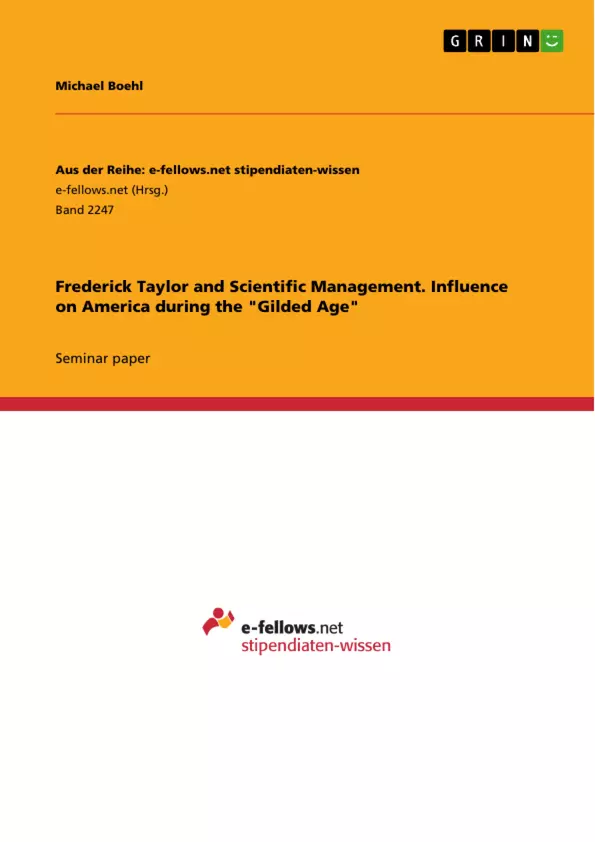America at the turn-of-the century was a rising nation. It was the time of the Gilded Age and the Progressive Era. It was in those years when Frederick Jackson Turner stated his “Frontier Thesis” and in which names like Rockefeller, the industrialist, Upton Sinclair, the writer or the W.E.B. Du Bois, the black leader, became well-known.
A few decades after the end of Civil War the country was still in search of an identity, what it wanted and what it stood for. The unrelenting conflict on the meaning of the term America was visible in various fields such as immigration, consumerism and the development of America’s economic system. The struggle for the shaping of America’s economic system can be more narrowly defined as the fight between the two production factors capital and labor.
The intention of this paper is to clarify what Scientific Management was, how it affected managers and workers, in others terms capital and labor. The following pages are going to show criticism of Scientific Management and qualify that. Furthermore, an assessment of Scientific Management and its results are given. The primary question of this paper is what impact did Scientific Management as one invention of America at the turn-of-the-century have on the country at that time, and whether there are remainders of Scientific Management either in America or in other parts of the world that are persistent today.
Inhaltsverzeichnis (Table of Contents)
- Introduction
- Scientific Management
- Frederick W. Taylor and his Principles of Scientific Management
- Scientific Management in practice
- Criticism on Scientific Management
- Conclusion
Zielsetzung und Themenschwerpunkte (Objectives and Key Themes)
This paper aims to clarify what Scientific Management was, its impact on managers and workers, and provide an assessment of its results. The paper will explore the criticism of Scientific Management and assess its persistence in America and other parts of the world.
- The evolution of America's economic system at the turn-of-the-century
- The role of Scientific Management in shaping American business practices
- The impact of Scientific Management on labor and capital
- The critical reception of Scientific Management
- The enduring legacy of Scientific Management
Zusammenfassung der Kapitel (Chapter Summaries)
Introduction
This chapter sets the scene for the paper by discussing America at the turn-of-the-century, highlighting the Gilded Age and the Progressive Era. It explores the ongoing search for national identity and the tension between capital and labor as key forces shaping America's economic system. The chapter introduces Frederick W. Taylor and his theory of Scientific Management as a significant development within this context.
Scientific Management
This chapter delves into the principles of Scientific Management, focusing on the work of Frederick W. Taylor. It examines his background and the evolution of his theories. The chapter discusses Taylor's emphasis on efficiency, his belief in the maximization of prosperity for both employers and employees, and his methods of analyzing and optimizing work processes. Specific examples of practical applications, such as functional foremanship, time study, and differential piece rate, are mentioned.
Schlüsselwörter (Keywords)
The key terms and focus topics of this paper include Scientific Management, Frederick W. Taylor, Gilded Age, Progressive Era, American economy, labor, capital, efficiency, industrialization, management, business practices, criticism, and legacy.
Frequently Asked Questions
What is Scientific Management?
Scientific Management is a theory of management that analyzes and synthesizes workflows to improve economic efficiency, especially labor productivity.
Who was Frederick W. Taylor?
Frederick W. Taylor was an American mechanical engineer who is widely considered the father of Scientific Management (also known as Taylorism).
What were the key principles of Taylorism?
The principles included replacing rule-of-thumb work methods with scientific study, scientifically selecting and training workmen, and dividing work between managers and workers.
What was the "Gilded Age" context?
The Gilded Age was a period of rapid industrialization and economic growth in the U.S. at the turn of the century, marked by intense struggle between capital and labor.
What were the criticisms of Scientific Management?
Critics argued that Taylorism dehumanized workers by turning them into "cogs in a machine" and focused too much on speed and efficiency at the expense of well-being.
Does Taylorism still exist today?
Yes, the paper assesses the persistence of Tayloristic methods in modern business practices and industrial systems worldwide.
- Citation du texte
- Michael Boehl (Auteur), 2005, Frederick Taylor and Scientific Management. Influence on America during the "Gilded Age", Munich, GRIN Verlag, https://www.grin.com/document/352640



